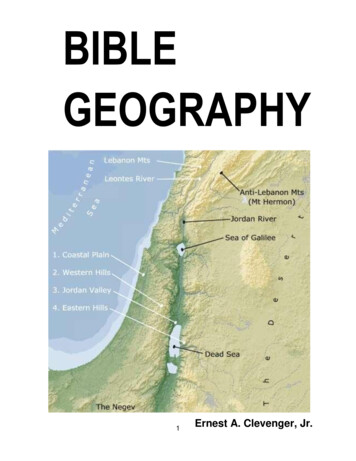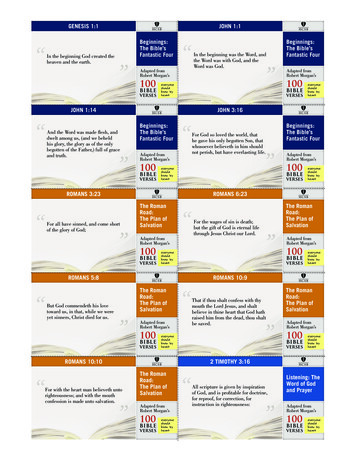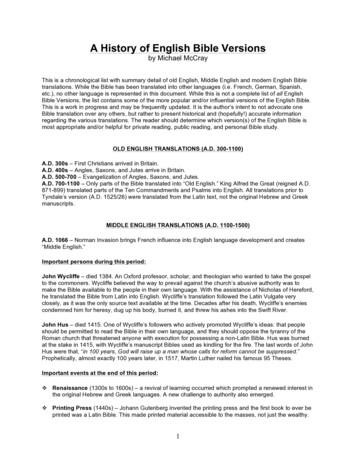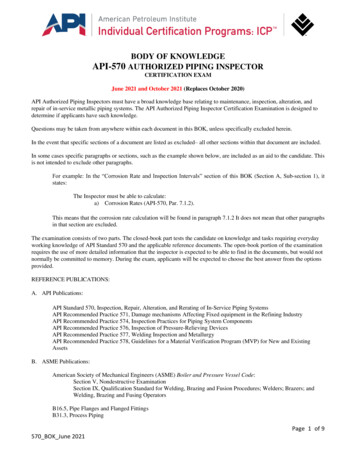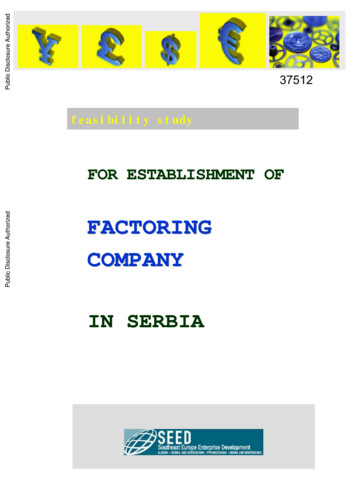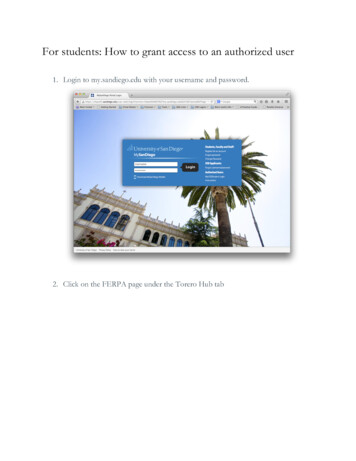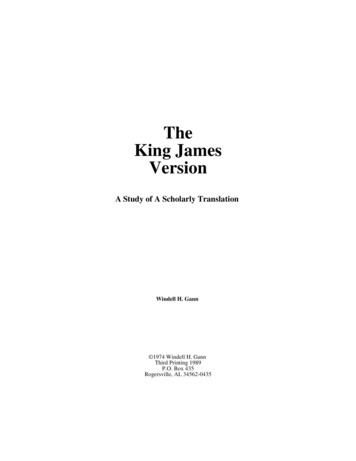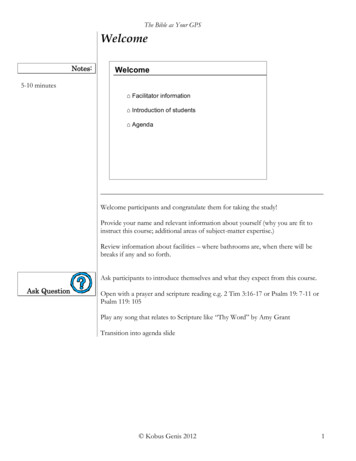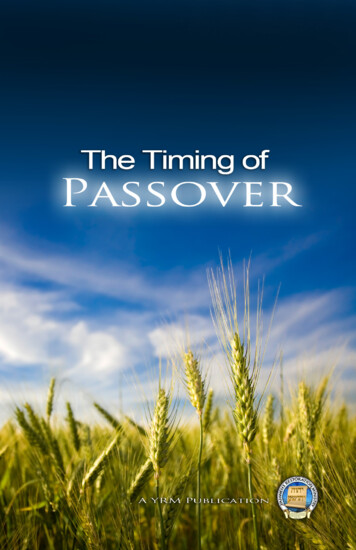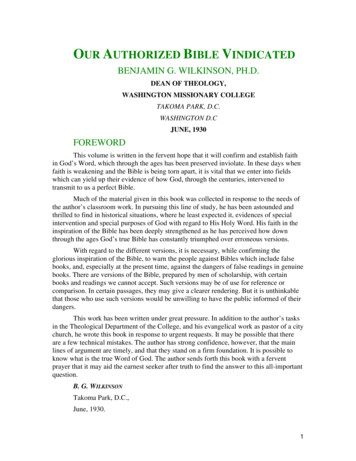
Transcription
OUR AUTHORIZED BIBLE VINDICATEDBENJAMIN G. WILKINSON, PH.D.DEAN OF THEOLOGY,WASHINGTON MISSIONARY COLLEGETAKOMA PARK, D.C.WASHINGTON D.CJUNE, 1930FOREWORDThis volume is written in the fervent hope that it will confirm and establish faithin God’s Word, which through the ages has been preserved inviolate. In these days whenfaith is weakening and the Bible is being torn apart, it is vital that we enter into fieldswhich can yield up their evidence of how God, through the centuries, intervened totransmit to us a perfect Bible.Much of the material given in this book was collected in response to the needs ofthe author’s classroom work. In pursuing this line of study, he has been astounded andthrilled to find in historical situations, where he least expected it, evidences of specialintervention and special purposes of God with regard to His Holy Word. His faith in theinspiration of the Bible has been deeply strengthened as he has perceived how downthrough the ages God’s true Bible has constantly triumphed over erroneous versions.With regard to the different versions, it is necessary, while confirming theglorious inspiration of the Bible, to warn the people against Bibles which include falsebooks, and, especially at the present time, against the dangers of false readings in genuinebooks. There are versions of the Bible, prepared by men of scholarship, with certainbooks and readings we cannot accept. Such versions may be of use for reference orcomparison. In certain passages, they may give a clearer rendering. But it is unthinkablethat those who use such versions would be unwilling to have the public informed of theirdangers.This work has been written under great pressure. In addition to the author’s tasksin the Theological Department of the College, and his evangelical work as pastor of a citychurch, he wrote this book in response to urgent requests. It may be possible that thereare a few technical mistakes. The author has strong confidence, however, that the mainlines of argument are timely, and that they stand on a firm foundation. It is possible toknow what is the true Word of God. The author sends forth this book with a ferventprayer that it may aid the earnest seeker after truth to find the answer to this all-importantquestion.B. G. WILKINSONTakoma Park, D.C.,June, 1930.1
4CONTENTS1 FUNDAMENTALLY, ONLY TWO DIFFERENT BIBLES2 THE BIBLE ADOPTED BY CONSTANTINE AND THE PURE BIBLE OF THEWALDENSES3 THE REFORMERS REJECT THE BIBLE OF THE PAPACY4. THE JESUITS AND THE JESUIT BIBLE OF 15825. THE KING JAMES BIBLE BORN AMID THE GREAT STRUGGLES OVER THEJESUIT VERSION6. COMPARISONS TO SHOW HOW THE JESUIT BIBLE REAPPEARS IN THEAMERICAN REVISED VERSION7 THREE HUNDRED YEARS OF ATTACK ON THE KING JAMES BIBLE8. HOW THE JESUITS CAPTURED OXFORD UNIVERSITY9 WESTCOTT AND HORT10 REVISION AT LAST11 BLOW AFTER BLOW AGAINST THE TRUTH12. BLOW AFTER BLOW IN FAVOR OF ROME13 CATHOLICS REJOICE THAT THE REVISED VERSION VINDICATES THEIRCATHOLIC BIBLE14 THE AMERICAN REVISION COMMITTEE: ITS INFLUENCE UPON THEFUTURE OF AMERICA15 THE RISING FLOOD OF MODERNISM AND MODERN BIBLES16 CONCLUSION5CHAPTER 1FUNDAMENTALLY, ONLY TWO DIFFERENT BIBLES“There is the idea in the minds of some people that scholarship demands thelaying aside of the Authorized Version of the Bible and taking up the latest RevisedVersion. This is an idea, however, without any proper bases. This Revised Version is inlarge part in line with what is known as modernism, and is peculiarly acceptable to thosewho think that any change, anywhere or in anything, is progress. Those who have reallyinvestigated the matter, and are in hearty sympathy with what is evangelical, realize thatthis Revised Version is a part of the movement to ‘modernize’ Christian thought and faith2
and do away with the established truth.” The Herald and Presbyter (Presbyterian), July16, 1924, p. 10.IN ONE of our prominent publications, there appeared in the winter of 1928, an articleentitled, “Who Killed Goliath?” and in the spring of 1929, an article named, “TheDispute About Goliath.” Attention was called to the fact that in the American RevisedVersion, 2 Samuel 21:19, we read that Elhanan killed Goliath. A special cablegram fromthe “most learned and devout scholars” of the Church of England, said in substance, thatthe Revised Version was correct, that Elhanan and not David killed Goliath; that therewere many other things in the Bible which were the product of exaggeration, such as thestory of Noah and the ark, of Jonah and the whale, of the Garden of Eden, and of thelongevity of Methuselah. The first article says that these modern views have been heldand taught in practically all American theological seminaries of standing, and that youngministers being graduated from them, have rejected the old beliefs about these eventswhether the public knew it or not. This publication aroused a national interest and itsoffice was “inundated,” as the editor says, with letters as to whether this Revised Versionis correct, or whether, as we have always believed, according to the Authorized Version,David killed Goliath. fa1Is the American Revised Version correct on this point, or is the Bible, which hasled the Protestant world for three hundred years, correct? Is the Revised Version correctin thousands of other changes made, or is the King James Version correct?Back of this and other changes lie the motives and events which, in 1870, broughtinto existence the Committees which produced the Revised Versions — both the Englishand the American. During the three hundred and fifty years following the Reformation,repeated attempts were made to set aside the Greek New Testament, called the ReceivedText, from which the New Testament of the King James in English and other ProtestantBibles in other languages were translated.Many individual efforts produced different Greek New Testaments. Likewisefurious attacks were made upon the Old Testament in Hebrew, from which the KingJames and other Bibles had been translated. None of these assaults, however, met withany marked success until the Revision Committee was appointed by the southern half ofthe Church of England under the Archbishop of Canterbury, — although the same churchin the northern half of England under the Archbishop of York, refused to be a party to theproject.This Revision Committee, besides the changes in the Old Testament, made over5000 changes in the Received Text of the New Testament and so produced a new GreekNew Testament. This permitted all the forces hostile to the Bible to gather themselvestogether and pour through the breach. Since then, the flood gates have been opened andwe are now deluged with many different kinds of Greek New Testaments and withEnglish Bibles translated from them, changed and mutilated in bewildering confusion.Again, in the story of the dark hour when Jesus hung on the cross, the King JamesBible declares that the darkness which was over the whole land from the sixth to the ninthhour was produced because the sun was darkened. This reason offers the Christianbeliever a testimony of the miraculous interposition of the Father in behalf of His son,similar to the darkness which afflicted Egypt in the plagues upon that nation.3
In the New Testament, as translated by Moffatt and certain other modern Bibles,we are told that the darkness was caused by an eclipse of the sun. Of course, a darknesscaused by an eclipse of the sun is very ordinary; it is not a miracle. Moreover, Christ wascrucified at the time of the Passover which always occurred when the moon was full. Atthe time of a full moon, no eclipse of the sun is possible. Now which of these two recordsin Greek did God write: the miraculous, as recorded in the King James Bible and whichwe have believed for three hundred years; or the unnatural and impossible, as recorded inMoffatt’s translation? Moffatt and the Revisers both used the same manuscript.Some of those who had part in these Revised and Modern Bibles were highercritics of the most pronounced type. At least one man sat on the Revision Committee of1881 who had openly and in writing denied the divinity of our Lord and Saviour JesusChrist. On this account, their chairman of high standing absented himself almost from thefirst.fa2 Also, men sat on the Revision Committee who, openly and in a critical hour whentheir word was of weight, had defended the great movement to Romanize the Church ofEngland.It is too late to beguile us with soothing words that all versions and all translationsare of equal value; that nowhere is doctrine affected. Doctrine is seriously affected. Sowrote Dr. G. V. Smith, a member of the English New Testament Revision Committee:“Since the publication of the revised New Testament, it has been frequently said that thechanges of translation which the work contains are of little importance from a doctrinalpoint of view. To the writer, any such statement appears to be in the most substantialsense contrary to the facts of the case.” fa3Life is bigger than logic. When it comes to the philosophy of life, scholarship andscience are not the all which counts. It is as true to-day as in the days of Christ, that “thecommon people heard him gladly.” If it be a question of physics, of chemistry, ofmathematics, or of mechanics, there, scientists can speak with authority. But when it is aquestion of revelation, of spirituality, or of morality, the common people are ascompetent judges as are the product of the schools. And in great crises, history hasfrequently shown that they were safer.Experience also determines issues. There are those among us now who wouldchange the Constitution of the United States, saying: “Have we not men to-day who haveas great intellect as Washington, Adams, Jefferson, and the others? Have we not muchmore light than they? Why must we be tied to what they taught?” We will not deny thatthere are men now living as brilliant as the founding fathers. But no men to-day everwent through the same experience as the framers of the Constitution. Those pioneerswere yet witnesses of the vicious principles of the Dark Ages and their cruel results. Theywere called upon to suffer, to endure, to fight, that principles of a different nature mightbe established. Experience, not reading or philosophizing, had thoroughly wrought inthem the glorious ideals incorporated into the fundamental document of the land.Experience can throw some light also upon the relative value of Bible Versions.The King James Bible was translated when England was fighting her way out fromCatholicism to Protestantism; whereas, the Revised Version was born after fifty years(1833–1883) of terrific Romanizing campaigns, when one convulsion after anotherrocked the mental defenses of England and broke down the ascendancy of the Protestant4
mentality in that empire. The King James Version was born of the Reformation; theRevised Versions and some modern Bibles were born of Higher Criticism andRomanizing activities, as this treatise will show.We hear a great deal to-day about the Sunday Law of the Roman EmperorConstantine, 321 A.D. Why is it that we do not hear about the corrupt Bible whichConstantine adopted and promulgated, the version which for 1800 years has beenexploited by the forces of heresy and apostasy? This Bible, we regret to say, lies at thebottom of many versions which now flood the publishing houses, the schools, thechurches, yes, many homes, and are bringing confusion and doubt to untold millions.Down through the centuries, the pure Bible, the living Word of God, has oftenfaced the descendants of this corrupt Version, robed in splendor and seated on the throneof power. It has been a battle and a march, a battle and a march. God’s Holy Word hasalways won; to its victories we owe the very existence of Christian civilization and all thehappiness we now have and hope for in eternity. And now, once again, in these last days,the battle is being renewed, the affections and the control of the minds of men are beingcontended for by these two rival claimants.Devotion to error can never produce true righteousness. Out of the presentconfusion of Bibles, I propose to trace the situation back to its origin, that our hearts maybe full of praise and gratitude to God for the marvelous manner in which He has given tous and preserved for us the Holy Scriptures.THE HEBREW TEXT OF THE OLD TESTAMENTFor the present, the problem revolves mostly around the thousands of differentreadings in the Greek New Testament manuscripts. By the time of Christ, the OldTestament was in a settled condition. Since then, the Hebrew Scriptures had been carrieddown intact to the day of printing (about 1450 A.D.) by the unrivalled methods of theJews in transmitting perfect Hebrew manuscripts.Whatever perplexing problems there are in connection with the Old Testament,these have largely been produced by translating it into Greek and uniting that translationto the Greek New Testament. It is around the problems of the Greek New Testament thatthe battle for centuries has been fought. We must, therefore, confine ourselves largely tothe Christian Era; for the experience which befell the New Testament and thecontroversies that raged around it, also befell the Old Testament. Moreover, the Revisers,themselves, would have no one think for an instant that they used any other MSS. inrevising the Old Testament than the Massoretic text, the only reliable Hebrew Bible. Dr.Ellicott, chairman of the English New Testament Committee, repeatedly recommends thestory of the Old Testament Revision by Dr. Chambers.Dr. Chambers says:—“The more sober critics with one consent hold fast the Massoretic text. This hasbeen the rule with the authors of the present revision. Their work is based throughoutupon the traditional Hebrew. In difficult or doubtful places, where some corruption seemsto have crept in or some accident to have befallen the manuscript, the testimony of theearly versions is given in the margin, but never incorporated with the text.”fa4THE APOSTASY OF THE EARLY CHRISTIAN CHURCH5
PREPARES THE WAY FOR CORRUPTING THE MANUSCRIPTSInspired by the unerring Spirit of God, chosen men brought forth the different books ofthe New Testament, these originally being written in Greek. For a few years, under theguidance of the noble apostles, believers in Christ were privileged to have theunadulterated Word of God. But soon the scene changed; the fury of Satan, robbed offurther opportunity to harass the Son of God, turned upon the written Word. Hereticalsects, warring for supremacy, corrupted the manuscripts in order to further their ends.“Epiphanius, in his polemic treatise the ‘Panarion,’ describes not less than eightyheretical parties. ”fa5 The Roman Catholics won. The true church fled into thewilderness, taking pure manuscripts with her.When the apostle Paul foretold the coming of the great apostasy in his sermon andlater in his epistle to the Thessalonians, he declared that there would “come a fallingaway,” 2 Thessalonians 2:3; and then he added that the “mystery of iniquity doth alreadywork.” 2 Thessalonians 2:7. Later when he had gathered together, on his journey toJerusalem, the bishops, those who were over the church of Ephesus, he said, “Of yourown selves shall men arise, speaking perverse things, to draw away disciples after them.Therefore watch, and remember, that by the space of three years I ceased not to warnevery one night and day with tears.” Acts 20:30, 31.Though there are many important events in the life of the great apostle whichhave been left unrecorded, the Holy Spirit deemed it of high importance to put on recordthis prophecy, to warn us that even from among the elders or bishops there would ariseperverse leadership. This prophecy would be fulfilled, — was fulfilled. Until we sensethe importance of this great prediction of the Holy Spirit and come to recognized itscolossal fulfillment, the Bible must in many things remain a sealed book.When Paul was warned of the coming apostasy, he aroused the Thessalonians notto be soon shaken or troubled in spirit “by letter as from us.” 2 Thessalonians 2:2. Itwould have been bold at any time to write a letter to a church and sign to it the apostle’sname. But how daring must have been that iniquity which would commit that forgeryeven while the apostle was yet alive! Even in Paul’s day, the apostasy was built onlawless acts.Later in his labors, Paul specifically pointed out three ways in which the apostasywas working;1, by exalting man’s knowledge above the Bible;2, by spiritualizing the Scriptures away; and lastly,3, by substituting philosophy for revelation.1 — FALSE KNOWLEDGE EXALTED ABOVE SCRIPTUREOf the first of these dangers we read as follows: “O Timothy, keep that which iscommitted to thy trust, avoiding profane and vain babblings, and oppositions of sciencefalsely so called.” 1 Timothy 7:20.The Greek word in this verse which is translated “science” is “gnosis.” “Gnosis”means knowledge. The apostle condemned, not knowledge in general, but falseknowledge. False teachers were placing their own interpretations on Christian truth by6
reading into it human ideas. This tendency grew and increased until a great systembearing the name of Christianity, known as Gnosticism, was established. To show thatthis religion was not a theory without an organization among men, but that it hadcommunities and was widespread, I quote from Milman:“The later Gnostics were bolder, but more consistent innovators on the simplescheme of Christianity. In all the great cities of the East in which Christianity hadestablished its most flourishing communities, sprang up this rival which aspired to a stillhigher degree of knowledge than was revealed in the Gospel, and boasted that it soaredalmost as much above the vulgar Christianity as the vulgar paganism. ”fa6The mysterious theories of these Gnostics have reappeared in the works oftheologians of our day. The following words from the Americana, will prove thetendency of this doctrine to break out in our times. Note the place of “aeons” in theirsystem:“There have been no Gnostic sects since the fifth century; but many of theprinciples of their system of emanations reappear in later philosophical systems, drawnfrom the same sources as theirs. Plato’s lively representation had given to the idea of theGodhead, something substantial, which the Gnostics transferred to their aeons. ”fa7In fact, the aeons system has found a treatment in the Revised Version.Bishop Westcott who was one of the dominating minds of the English NewTestament Revision Committee advocates that the Revised New Testament be read in thelight of the modern aeon theories of the Revisers. He comments thus on the revisedreading of Ephesians 3:21: “Some perhaps are even led to pause on the wonderful phrasein Ephesians 3:21, margin, ‘for all the generations of the age of the ages,’ which isrepresented in English (A. V.) by ‘to all generations forever and ever;’ and to reflect onthe vision so open of a vast aeon of the which the elements are aeons unfolding, as itwere, stage after stage, the manifold powers of one life fulfilled in many ways, each aeonthe child (so to speak) of that which has gone before. ”fa8J. H. Newman, the Oxford divine, who was made a Cardinal after he had left thechurch of England for the Church of Rome, and whose doctrines, in whole or in part,were adopted by the majority of the Revisers, did more to influence the religion of theBritish Empire than any other man since the Reformation. He was invited to sit on theRevision Committee. Dr. S. Parkes Cadman speaks thus, referring to his Gnosticism:“From the fathers, Newman also derived a speculative angelology whichdescribed the unseen universe as inhabited by hosts of intermediate beings who werespiritual agents between God and creation. Indeed, Newman’s cosmogony wasessentially Gnostic, and echoed the teachings of Cerinthus, who is best entitled to beconsidered as the link between the Judaizing and Gnostic sects. ”fa9The following quotation from a magazine of authority gives a description of thismodern species of Gnosticism which shows its Romanizing tendency. It also reveals howBishop Westcott could hold this philosophy, while it names Dr. Philip Schaff, Presidentof both American Committees of Revision, as even more an apostle of this modernGnosticism:7
“The roads which lead to Rome are very numerous. Another road, lessfrequented and less obvious, but not less dangerous, is the philosophical. There is astrong affinity between the speculative system of development, according to which everything that is, is true and rational, and the Romish idea of a self-evolving infalliblechurch. No one can read the exhibitions of the Church and of theology written even byProtestants under the influence of the speculative philosophy, without seeing that littlemore than a change of terminology is required to turn such philosophy into Romanism.Many distinguished men have already in Germany passed, by this bridge, fromphilosophical skepticism to the Romish Church. A distinct class of the Romanizingportion of the Church of England belongs to this philosophical category. Dr. Nevin hadentered this path long before Dr. Schaff came from Germany to point it out to him.”fa102 — SPIRITUALIZING THE SCRIPTURES AWAYThe next outstanding phase of the coming apostasy, — spiritualizing theScriptures away, — is predicted by the apostle:“But shun profane and vain babblings; for they will increase unto moreungodliness. And their word will eat as doth a canker: of whom is Hymenaeus andPhiletus; who concerning the truth have erred, saying that the resurrection is past already;and overthrow the faith of some.” 2 Timothy 2:16-18.The Bible teaches the resurrection as a future event. One way these prominentteachers, full of vanity, could say that it was past, was to teach, as some of theirdescendants do to-day, that the resurrection is a spiritual process which takes place, say,at conversion. The prediction of the apostle was fulfilled in a great system of Biblespiritualizing or mystifying which subverted the primitive faith. Turning the Scripturesinto an allegory was a passion in those days. In our day, allegorizing is not only apassion, but is also a refuge from truth for many leaders with whom we have to do.3 — SUBSTITUTING PHILOSOPHY FOR SCRIPTUREThe third way in which the apostasy came, was predicted by the apostle thus:“Beware lest any man spoil you through philosophy and vain deceit, after thetradition of men, after the rudiments of the world, and not after Christ.” Colossians 2:8.The philosophy condemned in this passage is not the philosophy found in thesacred Word, but the philosophy which is “after the tradition of men.”Even before the days of Christ, the very existence of the Jewish religion wasthreatened by intellectual leaders of the Jews who were carried away with the subtletiesand glamour of pagan philosophy. This same temptress quickly ensnared multitudes whobore the name of Christian.“Greek philosophy exercised the greatest influence not only on the Christianmode of thought, but also through that on the institutions of the Church. In the completedchurch we find again the philosophic schools.”fa11The greatest enemies of the infant Christian church, therefore, were not found inthe triumphant heathenism which filled the world, but in the rising flood of heresy which,under the name of Christianity, engulfed the truth for many years. This is what brought8
on the Dark Ages. This rising flood, as we shall see, had multiplied in abundance copiesof the Scriptures with bewildering changes in verses and passages within one hundredyears after the death of John (100 A. D.).As Irenaeus said concerning Marcion, the Gnostic:“Wherefore also Marcion and his followers have betaken themselves to mutilatingthe Scriptures, not acknowledging some books at all; and, curtailing the Gospel accordingto Luke, and the epistles of Paul, they assert that these alone are authentic, which theyhave themselves shortened. ”fa12FUNDAMENTALLY, THERE ARE ONLY TWO STREAMS OF BIBLESAnyone who is interested enough to read the vast volume of literature on thissubject, will agree that down through the centuries there were only two streams ofmanuscripts.The first stream which carried the Received Text in Hebrew and Greek, beganwith the apostolic churches, and reappearing at intervals down the Christian Era amongenlightened believers, was protected by the wisdom and scholarship of the pure church inher different phases; by such as the church at Pella in Palestine where Christians fled,when in 70 A. D. the Romans destroyed Jerusalemfa13; by the Syrian Church of Antiochwhich produced eminent scholarship; by the Italic Church in northern Italy; and also atthe same time by the Gallic Church in southern France and by the Celtic Church in GreatBritain; by the pre-Waldensian, the Waldensian, and the churches of the Reformation.This first stream appears, with very little change, in the Protestant Bibles of manylanguages, and in English, in that Bible known as the King James Version, the one whichhas been in use for three hundred years in the English speaking world. These MSS. havein agreement with them, by far the vast majority of numbers. So vast is this majority thatthe enemies of the received Text admit that nineteen-twentieths and some ninety-nineone-hundredths of all Greek MSS. are of this class; while one hundred per cent of theHebrew MSS. are for the Received Text.The second stream is a small one of a very few manuscripts. These last MSS. arerepresented:(a) In Greek: — The Vatican MS., or Codex B, in the library at Rome; and theSinaitic, or Codex Aleph (#), its brother. We will fully explain about these two MSS.later.(b) In Latin: — The Vulgate or Latin Bible of Jerome.(c) In English: — The Jesuit Bible of 1582, which later with vast changes is seenin the Douay, or Catholic Bible.(d) In English again: — In many modern Bibles which introduce practically allthe Catholic readings of the Latin Vulgate which were rejected by the Protestants of theReformation; among these, prominently, are the Revised Versions.So the present controversy between the King James Bible in English and themodern versions is the same old contest fought out between the early church and rival9
sects; later between the Waldenses and the Papists from the fourth to the thirteenthcenturies; and later still, between the Reformers and the Jesuits in the sixteenth century.THE APOSTLE PAUL PREPARES TO PRESERVE THE TRUTHAGAINST COMING APOSTASYIn his later years, the apostle Paul spent more time in preparing the churches forthe great future apostasy than in pushing the work farther on. He foresaw that thisapostasy would arise in the west. Therefore, he spent years laboring to anchor the Gentilechurches of Europe to the churches of Judea.The Jewish Christians had back of them 1500 years of training. Throughout thecenturies God had so molded the Jewish mind that it grasped the idea of sin; of aninvisible Godhead; of man’s serious condition; of the need for a divine Redeemer. Butthroughout these same centuries, the Gentile world had sunk lower and lower in frivolity,heathenism, and debauchery.It is worthy of notice that the apostle Paul wrote practically all of his epistles tothe Gentile churches, — to Corinth, to Rome, to Philippi, etc. He wrote almost no lettersto the Jewish Christians. Therefore, the great burden of his closing days was to anchor theGentile churches of Europe to the Christian churches of Judea. In fact, it was to securethis end that he lost his life.“St. Paul did his best to maintain his friendship and alliance with the JerusalemChurch. To put himself right with them, he traveled up to Jerusalem, when fresh fieldsand splendid prospects were opening up for him in the West. For this purpose hesubmitted to several days restraint and attendance in the Temple, and the resultsvindicated his determination.”fa14This is how Paul used churches in Judea as a base. — ”For ye, brethren, becamefollowers of the churches of God which in Judea are in Christ Jesus: for ye also havesuffered like things of your own countrymen, even as they have of the Jews.” I Thess.2:14.“There is not a word here of the church of Rome being the model after which theother churches were to be formed; it had no such preeminence: — this honor belonged tothe churches of Judea; it was according to them, not the church at Rome, that the Asiaticchurches were modeled. The purest of all the apostolic churches was that of theThessalonians, and this was formed after the Christian churches in Judea. Had anypreeminence or authority belonged to the church of Rome, the apostle would haveproposed this as a model to all those which he formed, either in Judea, Asia Minor,Greece, or Italy.”fa15EARLY CORRUPTION OF BIBLE MSS.The last of the apostles to pass away was John. His death is usually placed about100 A. D. In his closing days, he cooperated in the collecting and forming of thosewritings we call the New Testament.fa16 An ordinary careful reading of Acts, Chapter 15,will prove the scrupulous care with which the early church guarded her sacred writings.And so well did God’s true people through the ages agree on what was Scripture andwhat was not, that no general council of the church, until that of Trent (1645) dominated10
by the Jesuits, dared to say anything as to what books should comprise the Bible or whattexts were or were not spurious.fa17While John lived, heresy could make no serious headway. He had hardly passedaway, however, before perverse teachers infested the Christian Church. The doom ofheathenism, as a controlling force before the superior truths of Christianity, was soonforeseen by all. These years were times which saw the New Testament books corruptedin abundance.Eusebius is witness to this fact. He also relates that the corrupted manuscriptswere so prevalent that agreement between the copies was hopeless; and that t
4 contents 1 fundamentally, only two different bibles 2 the bible adopted by constantine and the pure bible of the waldenses 3 the reformers reject the bible of the papacy 4. the jesuits and the jesuit bible of 1582 5. the king james bible born amid the great struggles over the jesuit version 6. comparisons to show how the jesuit bible reappears in the
